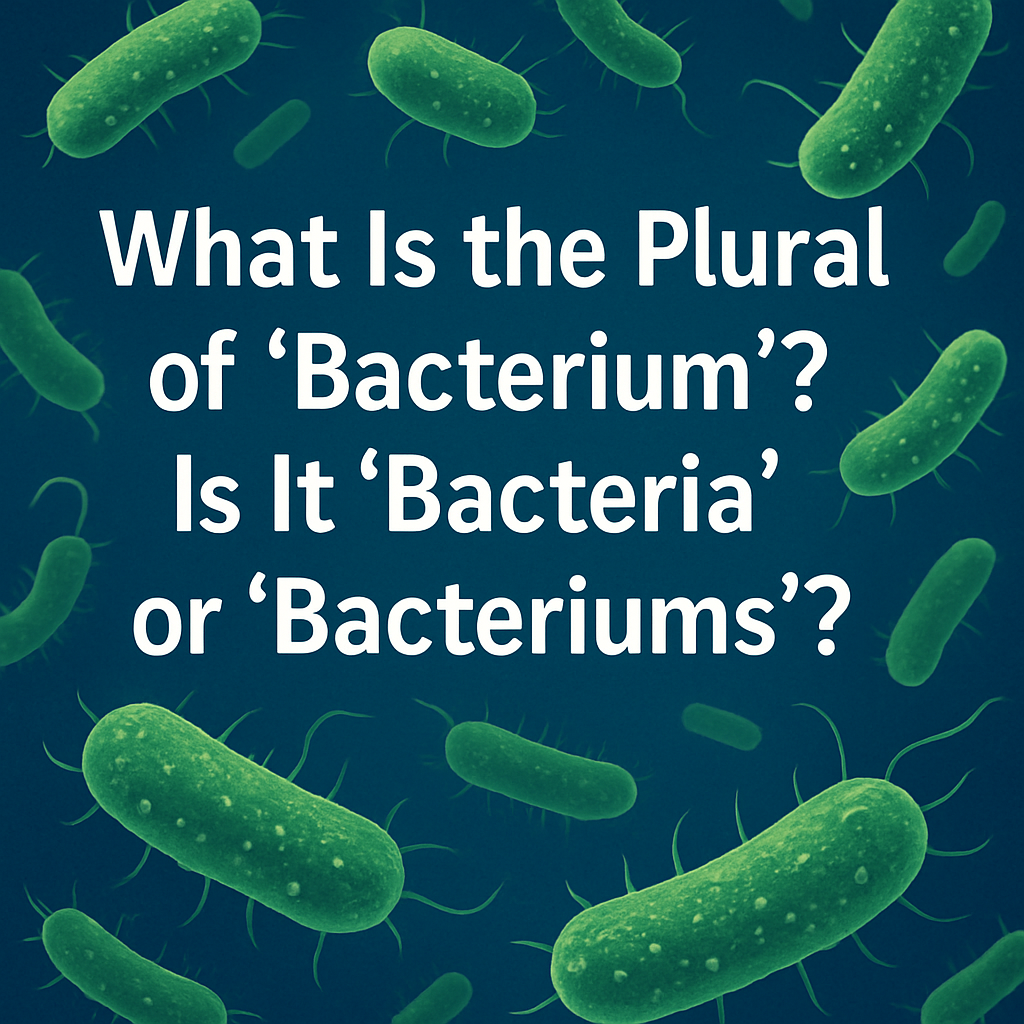Words rooted in Latin often confuse English speakers. One of the most common examples is the plural of ‘bacterium’. If you’ve ever wondered whether it’s correct to say “bacteria” or “bacteriums”, you’re not alone.
Let’s clear up the confusion with facts, examples, and explanations that will make this topic simple and unforgettable.
Origin of the Word ‘Bacterium’
The word bacterium comes from the Greek word bakterion, meaning “small staff or rod.” This referred to the rod-like shape of many microscopic organisms. The term was later adopted into Latin and then English.
- Bacterium is a Latin singular noun.
- Bacteria is its Latin plural form.
Words like this often retain their Latin pluralization, especially in academic and scientific contexts. That’s why understanding the singular to plural transition is key to correct grammar.
Singular vs. Plural: ‘Bacterium’ vs. ‘Bacteria’
Let’s break it down.
Singular Form: Bacterium
Use this when referring to a single microorganism.
Example:
- “The tiny bacterium under the microscope was identified as E. coli.
Plural Form: Bacteria
Use this when talking about more than one.
Example:
- “Scientists studied lots of bacteria collected from the sample.”
Here’s a simple comparison table:
| Singular | Plural | Origin |
|---|---|---|
| Bacterium | Bacteria | Latin |
| Datum | Data | Latin |
| Medium | Media | Latin |
| Criterion | Criteria | Greek |
Why Not ‘Bacteriums’?
You might think adding an “s” (as in bacteriums) makes sense. After all, that’s how English usually forms plurals. But this rule doesn’t apply to Latin-based scientific words.
Here’s why:
- “Bacteriums” is grammatically incorrect in academic, medical, and scientific writing.
- It reflects a hypercorrection, often made by speakers unfamiliar with the Latin origin.
“Bacteriums is a common error, but never correct in formal usage. The proper plural of bacterium is bacteria.”
— Dr. Elizabeth Hartwell, Professor of Microbiology, Harvard University
Usage in Sentences
Correct usage shows understanding. Let’s look at examples of both singular and plural usage in real-life contexts.
Singular Examples
- “A bacterium causes tuberculosis.”
- “Under the microscope, a bacterium appeared rod-shaped.”
- “Only one bacterium was present in the sterile solution.”
Plural Examples
- “Multiple bacteria were resistant to the antibiotic.”
- “The bacteria in yogurt support digestion.”
- “Scientists observed hundreds of bacteria thriving in the petri dish.”
Scientific vs. Informal Usage
In everyday conversation, people sometimes say:
- “That bacteria is dangerous.”
- “This bacteria lives in soil.”
But this is grammatically wrong.
Why?
Because “bacteria” is plural. You wouldn’t say “this cars is fast,” right? You’d say, “this car is fast.” Same logic applies.
In science and academia:
- Grammar rules are followed strictly.
- Mistakes like “bacteria is” or “bacteriums” discredit the writer.
Some Microorganisms and Their Plurals
Let’s compare bacterium with other tricky microorganism names.
Here’s a helpful chart:
| Singular | Plural | Notes |
|---|---|---|
| Bacterium | Bacteria | Latin origin |
| Fungus | Fungi | Latin, irregular plural |
| Alga | Algae | Latin-based biological term |
| Virus | Viruses | English-style plural |
| Protozoon | Protozoa | Greek origin |
Common Mistakes and Misconceptions
Let’s bust a few myths.
Myth #1: “Bacteria is a singular word”
False. Bacteria is always plural.
Myth #2: “It’s okay to use bacteriums”
Wrong again. That’s not acceptable in any standard English usage.
Myth #3: “People say it, so it must be right”
Not quite. Spoken English often bends the rules. But for writing, academic work, or science, correctness counts.
How to Always Get It Right
Here’s how to never mess up again:
Quick Guide:
- If it’s just one, it’s a bacterium.
✅ “That bacterium is harmful.” - If it’s more than one, it’s bacteria.
✅ “Bacteria multiply quickly.”
Mnemonic Trick:
If you’re seeing it under a scope,
One bacterium—use singular with hope.
If there’s a colony in the dish,
Say bacteria, that’s the wish!
Real-World Application: A Mini Case Study
Scenario: A Lab Report Miscommunication
Two biology students submitted a report. One wrote:
“This bacteria lives in clean water.”
The other wrote:
“This bacterium lives in clean water.”
The professor highlighted the first sentence as incorrect. Why? Because the student referred to a single organism but used a plural noun.
FAQs
Can I ever say “bacteriums”?
No. There’s no situation in formal or informal English where bacteriums is correct.
Is “bacteria is” ever acceptable?
No. Use “bacteria are” unless you’re speaking informally—and even then, it’s risky.
Are there any exceptions?
Not for bacterium. Some Latin-based words allow English-style plurals, but not this one.
Conclusion
Let’s keep it simple:
✅ The plural of bacterium is bacteria.
❌ Never use “bacteriums.”
Scientific terms often keep their Latin plural forms, and understanding these nuances boosts your writing and speaking credibility.
Next time you’re about to write or say bacteriums, pause and remember:
- One bacterium
- Many bacteria
